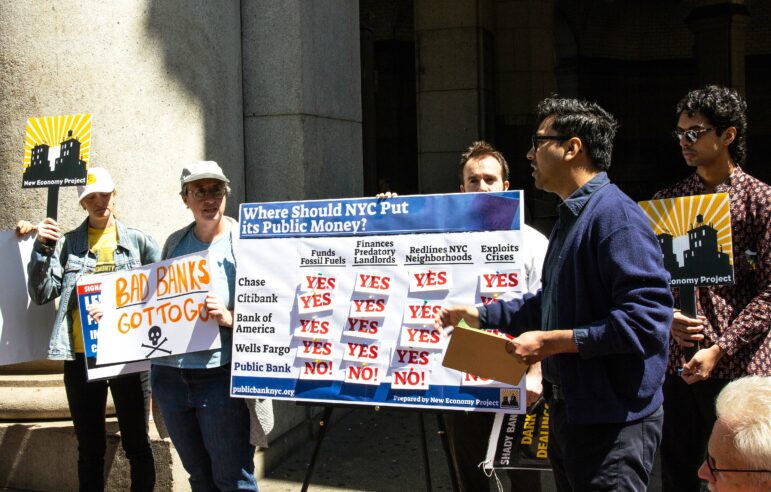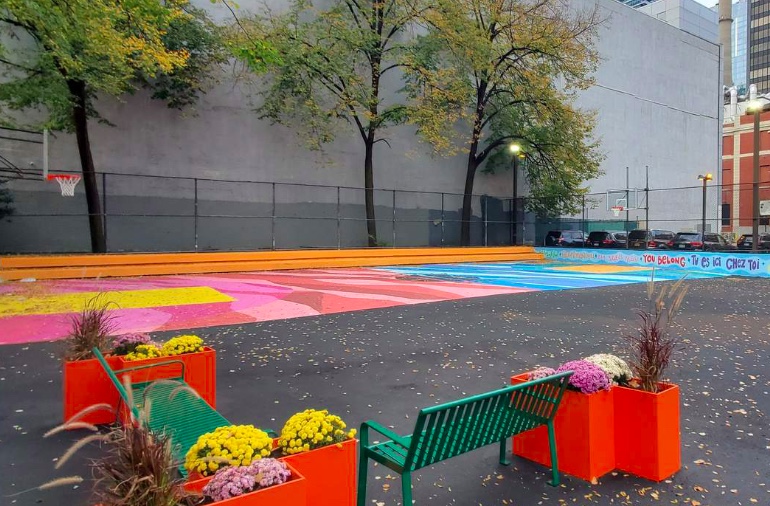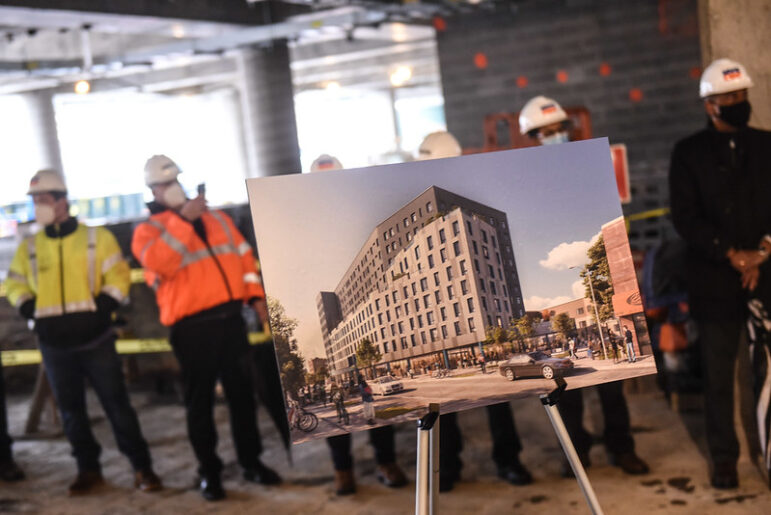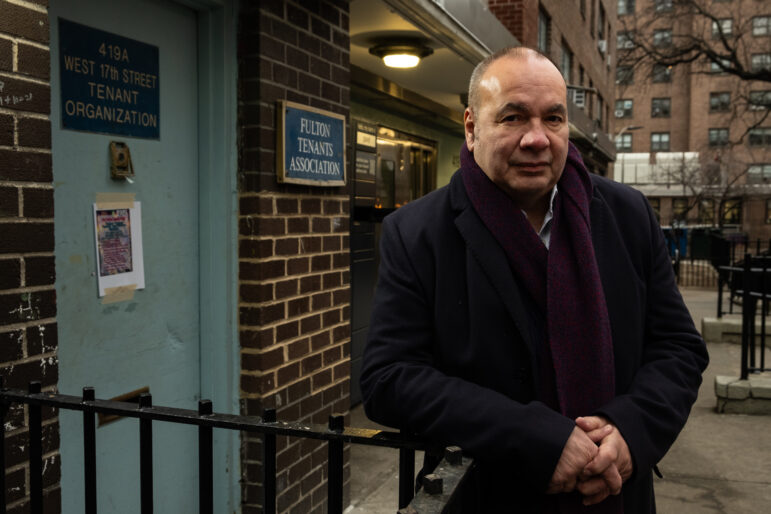If you were to walk by without taking a second look at the many flyers that adorn the window of the Black Success Unisex II barber shop on New Lots Avenue, a modest storefront wedged on the border between Brownsville and East New York, very little would distinguish it from any number of the barber shops and beauty salons that cater primarily to lower-income people of color throughout New York City.
A Barack Obama campaign poster is taped up, for example, next to local ads for newly-opened family daycare centers and upcoming church events. Take a closer look at some of the information posted on the window of Black Success, though – at the tattered white flyer that asks passerby whether or not a felony conviction can affect your right to vote, or the advertisement for job skills training programs organized by Brooklyn Workforce Innovations, an organization that helps the unemployed and working poor move up the job ladder – and the role of the black barber shop as a community gathering place takes on an entirely different meaning.
“If somebody comes in who has lost a job, I’ll show them what’s left on the window and tell them they can try that,” says Al Gleaton-Mathieu, 46, the owner of Black Success Unisex II. “Somebody will tell me that they’re looking for a type of trade program, I’ll tell them how to get there, the information about it, basically that type of stuff.”
A low-key connector whose salt-and-pepper beard is often complemented by a grey skullcap, Gleaton-Mathieu opened the Black Success Unisex II barber shop in 1996, two years after returning to Brownsville following a prison term for possession of a controlled substance. A father of two and neighborhood resident for most of his life, Gleaton-Mathieu has lived through the challenges of trying to make a fresh start for himself and his family.
When he first came home in 1994 through a work-release program, Gleaton-Mathieu worked a number of jobs, from helping out on movie sets to providing security for housing developments where drug trafficking was a problem. “I found it ironic for me to be doing that, considering the life that I had lived in the past,” he said recently. “I guess that was God’s plan for me.”
It wasn’t until Gleaton-Mathieu opened his own barbershop, using skills he picked up from watching his older brothers cut hair and pitching in at a friend’s barbershop after release, that he found a profession he views as having a more meaningful purpose. He has a strong faith in God, but doesn’t subscribe to any particular religious dogma. It’s a benefit “to intervene for people, to talk about some of my life experiences with kids, and people’s families,” he says. “It’s not just cutting hair, it’s more of a social base than anything.”
Gleaton-Mathieu perceives a lack of visible social services for the formerly incarcerated in Brownsville – and sees that as going hand in hand with the cycle of recidivism in the neighborhood.
~
According to the
When people leave prison, they generally return to their home neighborhoods. Yet “Connections and the Job Search 2008,” a guide published by the New York Public Library listing resources around the city for the formerly incarcerated, includes just five addresses in the Brownsville and East New York area that provide services aimed at the wide array of needs for the ex-offender; ranging from emergency shelter to drug treatment programs.
To Gleaton-Mathieu, that’s not nearly enough. “You don’t have anything that’s really local in these communities,” he says. “I think that’s one of the major issues, it’s not like where you can come out your door and it’s right in front of you. I think that plays a major factor.”
And, he says, another major need for those coming home from prison to Brownsville is simply more employment available. In the census tract that covers Black Success Unisex II barber shop, 22.3 percent of the more than 3,000 residents counted as part of the eligible labor force in the area are unemployed, compared to 7.4 percent citywide.
For its part, the state’s Department of Correctional Services has done several things to try to smooth the prison exit process for inmates and their families, according to DOCS spokesman Erik Kriss – but the process of re-entry into New York City life is largely dependent on the case of each individual inmate. The department attempts to transfer most inmates nearing the end of their upstate terms to medium- or minimum-security facilities in the metro area. DOCS also has moved parole hearings back from two months ahead of release, to four months, in order to give inmates more time to arrange for social services in their communities. And it informs inmates about their rights against discrimination by employers, as well as general reunification advice in a brochure called Coming Home.
Speaking from experience
Growing up in Brownsville’s Tilden Houses during the late 70s and early 80s, Gleaton-Mathieu was only 8 years old when an older brother was sent to prison, and he remembers the hardships that placed on his mother, Willa Lee (who moved to Brownsville from South Carolina in the 1950s), from an early age. Although his older brother tried to diminish the allure of criminal activity after his own return from prison, it wasn’t long before curiosity about life in the streets landed Gleaton-Mathieu in prison for armed robbery at 17.
“He saw the road that I was taking and he was like, ‘Man, you’re going to go to jail soon, you need to change your life up, you need to do this, and you need to do that.’ He tried, but he didn’t live with me, and I looked at it like, ‘You’re not my father, you can’t tell me anything,’” says Gleaton-Mathieu about his first experience with the criminal justice system. “I didn’t look at it as him trying to spare me from the experiences that he had actually seen.”
Although the pull toward criminal activity led Gleaton-Mathieu to prison early in his life as a teenager, the full reality of a life that would include cycling in and out of prison hit him during his second period of time in prison; and he identifies a commitment to being a bigger presence in the life of his two daughters, Shakiya and Jasmine, and of his mother, for making him determined to stay out for good.
“The second time I went away, it was more or less the atmosphere of street life at that time,” says Gleaton-Mathieu. “I felt like a kid the first time being there, so [when I went away the second time], I was like depressed, I stuck by myself, I didn’t want to be there.”
Gleaton-Mathieu operates two other barbershops in the neighborhood in addition to Black Success Unisex II, and estimates that most of the barbers he employs have had some experience with the criminal justice system.
“It’s important to have a network,” says Craig Stevens, a barber at Unisex II for two years who has been to Rikers Island in the past. “Al was my network. He saw that I was struggling, but that I had potential.”
In addition to his role as a self-employed business owner who often starts his day around dawn and ends it at midnight, it’s Gleaton-Mathieu’s status as a community member who can speak uniquely to the challenges of incarceration that has made him a respected figure in the community by local pastors, activists and politicians alike.
“Everyone won’t talk to the pastor,” explains Pastor W.R. Billips of the Power up Faith Fellowship. Along with his wife, Pastor Karen Billips, the two work as “mutual go-betweens” among the police of the 73rd Precinct and those involved in gang activity. They also help to organize events that bring employers to young people in the area.
“Certain people Al can talk to, and they will open up to him faster than me.”
~
Places to turn
On a rainy Wednesday last month at the Brownsville Multipurpose Center, Tyrone Simpson, 31, shuffled his feet nervously as he waited to talk to one of the service providers assembled at a resource fair for ex-offenders and their families.
Simpson, who acknowledges a familiarity with Rikers Island and is currently unemployed, seemed somewhat overwhelmed by the wide array of employment-based, substance abuse treatment and housing-related non-profit agencies in attendance; but determined nonetheless to find work to support his daughter, Lily.
Still, he thought a more permanent, visible resource should be available in the area. “There needs to be a big building,” he said. “Where can you go to get a decent start?”
State Assemblyman William F. Boyland, a lifelong Brownsville resident whose 55th District encompasses parts of Brownsville, Ocean Hill, Bedford-Stuyvesant, Crown Heights and Bushwick, sponsored the information fair, which Gleaton-Mathieu also attended to pick up pamphlets. Boyland’s motivation for wanting to provide resources to people returning home from prison is relatively simple: “I want to get them help.”
“I talked to a lot of formerly incarcerated young men who just said that they don’t have any outlets, there are no support services, there are quite a few people who come home [from prison] that are shunned,” he said. He anticipates organizing such events in the community on a quarterly basis, and plans focusing the next one on mental health issues for ex-offenders this spring.
“I want a place where people can just talk about what’s going on in the community without feeling ashamed,” Boyland said.
Jessica Berlin is trying to provide another such place – at Family Bodega, located at the Unity Plaza Houses in East New York. As the program manager of Family Bodega, which provides case management to families – including many with members who are or have been incarcerated – Berlin says it’s important to have a support network that can ease the transition from a correctional setting. But she sees a richer network in place than some.
“Because there’s such a large number of people coping with those issues in this community, there are a lot of formal and informal resources here,” she says. One of the initiatives of Berlin’s organization, a program of the national nonprofit Family Justice, is maintaining a presence at truancy centers, “because there’s research that shows that people who are truant later have criminal justice involvement.”
Gleaton-Mathieu is turning his sights more toward prevention, as well. He has helped to start a neighborhood effort called “Unite Us Black Success” with the goal of deterring young children from choosing a life of crime.
“I’ve come across some good, determined young men, who have been inspiring. A couple young guys who’ve come here have gone to college, it’s a good thing,” he says. “Even some of the ones who’s a little rough, it’s just they’re channeling their energy in the wrong areas. So I try to more or less try to round it off in different conversations. You have to have a good eye for it.”
DOCS would like to stay abreast of re-entry programs around the state, and invites individuals and groups providing services to share contact information with Director of Transitional Services Karen McDaniel at karen.mcdaniel@docs.state.ny.us or (518) 457-3525.








